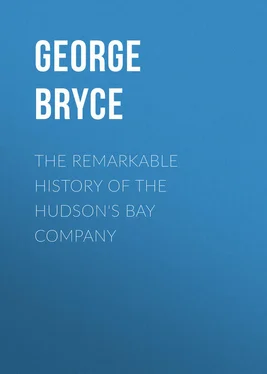George Bryce - The Remarkable History of the Hudson's Bay Company
Здесь есть возможность читать онлайн «George Bryce - The Remarkable History of the Hudson's Bay Company» — ознакомительный отрывок электронной книги совершенно бесплатно, а после прочтения отрывка купить полную версию. В некоторых случаях можно слушать аудио, скачать через торрент в формате fb2 и присутствует краткое содержание. Издательство: Иностранный паблик, Жанр: foreign_antique, foreign_prose, на английском языке. Описание произведения, (предисловие) а так же отзывы посетителей доступны на портале библиотеки ЛибКат.
- Название:The Remarkable History of the Hudson's Bay Company
- Автор:
- Издательство:Иностранный паблик
- Жанр:
- Год:неизвестен
- ISBN:нет данных
- Рейтинг книги:3 / 5. Голосов: 1
-
Избранное:Добавить в избранное
- Отзывы:
-
Ваша оценка:
- 60
- 1
- 2
- 3
- 4
- 5
The Remarkable History of the Hudson's Bay Company: краткое содержание, описание и аннотация
Предлагаем к чтению аннотацию, описание, краткое содержание или предисловие (зависит от того, что написал сам автор книги «The Remarkable History of the Hudson's Bay Company»). Если вы не нашли необходимую информацию о книге — напишите в комментариях, мы постараемся отыскать её.
The Remarkable History of the Hudson's Bay Company — читать онлайн ознакомительный отрывок
Ниже представлен текст книги, разбитый по страницам. Система сохранения места последней прочитанной страницы, позволяет с удобством читать онлайн бесплатно книгу «The Remarkable History of the Hudson's Bay Company», без необходимости каждый раз заново искать на чём Вы остановились. Поставьте закладку, и сможете в любой момент перейти на страницу, на которой закончили чтение.
Интервал:
Закладка:
The Prince Society volume states: "We again hear of Radisson in Hudson Bay in 1685, and this is his last appearance in public records as far as is known." The only other reference is made by Dionne and Prudhomme in stating that Charlevoix declares "that Radisson died in England."
Patient search in the archives of the Hudson's Bay Company in London has enabled the writer to trace the history of Radisson on for many years after the date given, and to unearth a number of very interesting particulars connected with him; indeed, to add some twenty-five years hitherto unknown to our century to his life, and to see him pass from view early in 1710.
In 1687, Radisson was still in the employ of the Company, and the Committee decided that he should be made a denizen or subject of England. He arrived from Hudson Bay in October of this year, appeared before the Hudson's Bay Company Committee, and was welcomed by its members. It was decided that 50 l. be given as a gratuity to the adventurer till he should be again employed. On June 24th, 1688, Radisson again sailed in the ship for Hudson Bay, and during that year he was paid 100 l. as 50 per cent. dividend on his 200 l. worth of stock, and in the following year 50 l. as 25 per cent. dividend on his stock. As the following year, 1690, was the time of the "great dividend," Radisson was again rejoiced by the amount of 150 l. as his share of the profits.
The prosperity of the Company appears to have led to an era of extravagance, and to certain dissensions within the Company itself. The amounts paid Radisson were smaller in accordance with the straits in which the Company found itself arising from French rivalry on the Bay. In 1692 Sir William Young is seen strongly urging fuller consideration for Radisson, who was being paid at the reduced rate of 50 l. a year.
In the Hudson's Bay Company letter-book of this period we find a most interesting memorial of Sir William Young's in behalf of Radisson, with answers by the Company, on the whole confirming our narrative, but stating a few divergent points.
We give the memorial in full.
Dated December 20th, 1692, being plea of William Young, in behalf of Pierre Esprit Radisson: —
"Radisson, born a Frenchman, educated from a child in Canada, spent youth hunting and commercing with the Indians adjacent to Hudson Bay, master of the language, customs, and trade.
"Radisson being at New England about twenty-seven or twenty-eight years past, met there with Colonel Nichols, Governor of New York, and was by him persuaded to go to England and proffer his services to King Charles the Second, in order to make a settlement of an English factory in that bay.
"At his arrival, the said King, giving credit to Radisson for that undertaking, granted to Prince Rupert, the Duke of Albemarle, and others, the same Charter we do still claim by, thereby constituting them the proprietors of the said bay, under which authority he, the said Radisson, went immediately and made an English settlement there according to his promises.
"On his return to England the King presented him with a medal and gold chain. When rejected by the Company, he was compelled to return to Canada, his only place of abode. Joined the French and led an expedition to Hudson Bay. With the aid of Indians destroyed Company's factory and planted a New England factory in Port Nelson River.
"During the winter Radisson did no violence to the English, but supplied them with victuals, powder, and shot when their ship was cast away. Refused a present from the Indians to destroy the English, and gave them a ship to convey them away. Afterwards settled the French factory higher up the same river, where his alliance with the Indians was too strong for New England or Old England, and immediately after he went to France. Mr. Young, member of the Hudson's Bay Company, with leave from Sir James Hayes, deputy-governor, tried to hire him back to Hudson's Bay Company's service with large promises. During negotiations, Radisson unexpectedly arrived in London. Company's ships were ready to sail. Had just time to kiss the King's hand at Windsor and that of the Duke of York, then governor. They commended him to the care and kindness of Sir James Hayes and the Hudson's Bay Company, and commanded that he should be made an English citizen, which was done in his absence.
"Before sending him, the Company gave him two original actions in Hudson's Bay Company stock, and 50 l. for subsistence money, with large promises of future rewards for expected service.
"Arriving at Port Nelson he put Company in entire possession of that river, brought away the French to England, and took all the beavers and furs they had traded and gave them to the Company without asking share of the profits, although they sold for 7,000 l.
"He was kindly welcomed in England and again commended by the King. Committee presented him with 100 guineas, and entered in the books that he should have 50 l. added to the former 50 l. , until the King should find him a place, when the last 50 l. should cease. Had no place given him. Sir Edward Dering, deputy governor, influenced Committee to withdraw 50 l. , so he had only 50 l. to maintain self, wife, and four or five children, and servants, 24 l. of this going for house-rent. When chief factor at Nelson, was tempted by servants to continue to cheat the Company, was beaten because he refused.
Prays for payment of 100 l. and arrears, because:
"1. All but Sir Edward Dering think it just and reasonable.
"2. No place was given in lieu of 50 l.
"3. Of fidelity to the Company in many temptations.
"4. He never asked more than the Company chose to give.
"5. Imprisoned in bay in time of trade for not continuing to cheat the Company.
"6. The Company received from Port Nelson, after he gave it them, 100,000 l. worth of furs, which is now believed would have been lost, with their whole interest in the bay, if he had not joined them when invited.
"7. The original actions and the 100 l. revert to the Company at his death.
"8. Income inadequate to maintain wife and children in London.
"9. Debts great from necessity. Would be compelled to leave wife and children and shift for himself.
"10. He cannot sell original actions, since they cease with his life.
"11. Of King Charles' many recommendations to kindness of Company.
"12. French have a price on his head as a traitor, so that he cannot safely go home.
"13. Mr. Young further pleads that as Mr. Radisson was the author of the Company's prosperity, so he (Mr. Young) was the first to persuade him to join their service. That he (Mr. Young) had been offered a reward for his services in persuading him, which he had utterly refused. But now that this reward be given in the form of maintenance for Radisson in his great necessity, &c."
The Committee passes over the sketch of Radisson's life, which they do not gainsay.
In the second paragraph, they observe that Mr. Young stated their neglect to maintain Mr. Radisson without mentioning their reasons for so doing, which might have shown whether it was their unkindness or Radisson's desert.
They go on to take notice of the fact that about 1681 or 1682, Radisson and Groseilliers entered into another contract with the Company and received 20 l. Soon afterwards they absconded, went to France, and thence to Canada. Next year they joined their countrymen in an expedition to Port Nelson, animated by the report of Mr. Abram to the Company that it was the best place for a factory. They took their two barks up as far as they durst for fear of the English. Then the French in the fall built a small hut, which Mr. Young says was too strong for either New England or Old England without guns or works – a place merely to sleep in, manned only with seven French.
Читать дальшеИнтервал:
Закладка:
Похожие книги на «The Remarkable History of the Hudson's Bay Company»
Представляем Вашему вниманию похожие книги на «The Remarkable History of the Hudson's Bay Company» списком для выбора. Мы отобрали схожую по названию и смыслу литературу в надежде предоставить читателям больше вариантов отыскать новые, интересные, ещё непрочитанные произведения.
Обсуждение, отзывы о книге «The Remarkable History of the Hudson's Bay Company» и просто собственные мнения читателей. Оставьте ваши комментарии, напишите, что Вы думаете о произведении, его смысле или главных героях. Укажите что конкретно понравилось, а что нет, и почему Вы так считаете.












